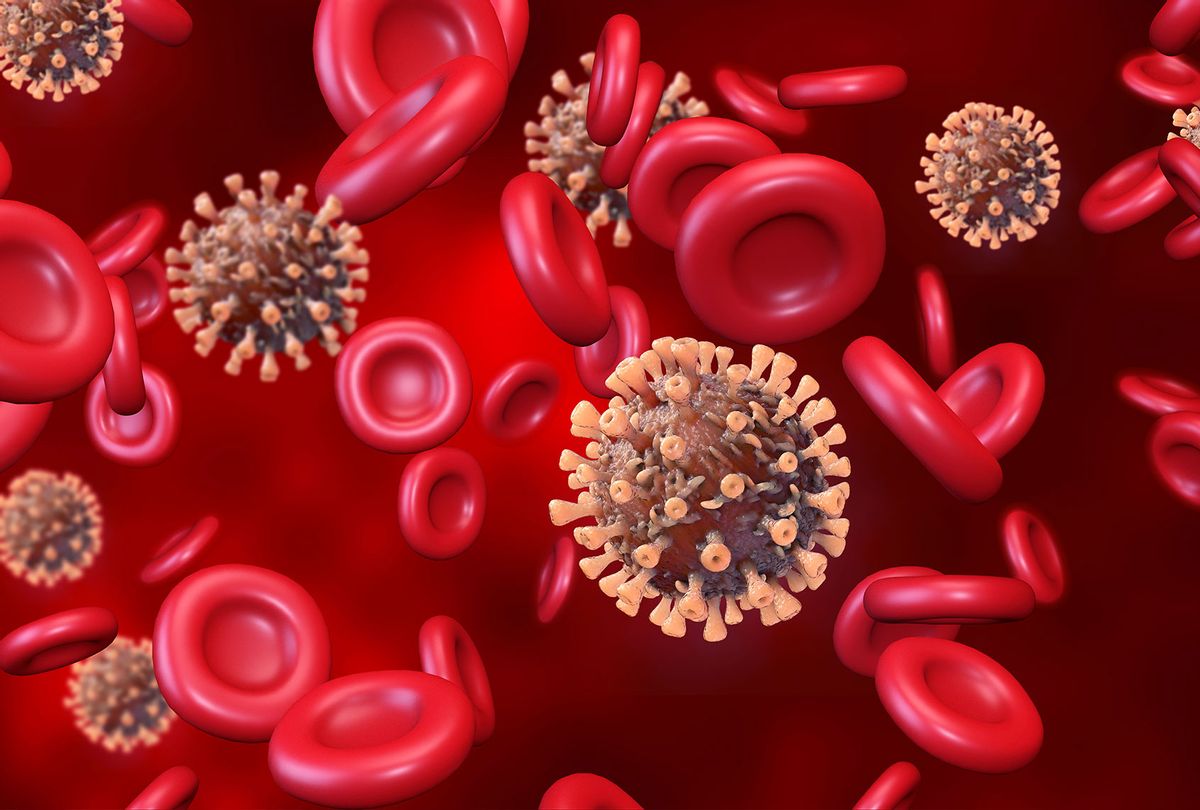There are many known risk factors for COVID-19 — chief among them age and immunocompromised status. Now, it turns out that one's blood type may play a role in the severity of one's COVID-19 symptoms, adding an unexpected twist to the body of knowledge about SARS-CoV-2, the virus that causes COVID-19.
According to a paper published last week in the journal PLOS Genetics, those with Type A blood are more likely to get severely sick from COVID-19. In the study, scientists screened more than 3,000 blood proteins to determine which ones actually caused positive or adverse COVID-19 outcomes. "Severity" was, in this context, defined as a COVID-19 case in which a patient required hospitalization and/or respiratory assistance — or actually led to the patient's death. By the time the scientists were done, they had whittled the number of potential protein suspects down to just over a dozen — and one of them happens to be a protein that determines your blood type.
RELATED: Could my blood type affect my chances of getting COVID-19?
"Our study does not link precise blood group with risk of severe COVID-19 but since previous research has found that proportion of people who are group A is higher in COVID-19 positive individuals, this suggests that blood group A is more likely candidate for follow-up studies," Christopher Hübel from King's College London, co-last author on the study, told New Atlas.
This does not mean that people with Type A blood should panic. There are still a number of other variables that are far more likely to make a person vulnerable to severe illness than blood type, including obesity, age, and pre-existing immune diseases. Even so, it is helpful for doctors to have the knowledge that blood type influences a patient's prognosis. In addition, there are implications to the findings that span beyond the immediate question of blood type.
"What we have done in our study is provide a shortlist for the next stage of research," co-last author on the study Gerome Breen from King's College London told New Atlas. "Out of 1,000s of blood proteins we have whittled it down to about 14 that have some form of causal connection to the risk of severe COVID-19 and present a potentially important avenue for further research to better understand the mechanisms behind COVID-19 with an ultimate aim of developing new treatments but potentially also preventative therapies."
Want more health and science stories in your inbox? Subscribe to Salon's weekly newsletter The Vulgar Scientist.
As the study's authors noted in their paper, there were four other proteins causally linked to increased risk of severe outcomes. Likewise, they identified three proteins where higher levels were associated with a decreased risk of hospitalization, need for respiratory support and/or death. Other blood proteins in their own unique ways were linked to more moderate, but still notable, improvements in patient outcomes. Some of these proteins were adhesion molecules, which help the immune system interact with blood vessels.
Scientists hope that learning more about how these molecules protect COVID-19 patients could save lives.
"In summary, molecules that mediate the interaction between immune cells and blood vessels may be important in late stage COVID-19 and moderate severity," the authors wrote.
This is not the first study to link blood type with COVID-19 outcomes. Scientists had observed a correlation as far back as July 2020. In addition to helping to treat COVID-19, the blood type connection also provides them with a pathway to learn more about how human genes influence their ability to effectively combat this coronavirus.
"What I found helpful was thinking, let's just assume there are some associations between blood type and Covid, dying of Covid or contracting the disease. What mechanism potentially could underlie this?" Michael N. Zietz of the Department of Biomedical Informatics, Columbia University Irving Medical Center, told Salon last year. "Blood type is determined by a few positions within a certain gene. It's possible that there are some true variants that are affecting Covid susceptibility within that gene. We don't definitively know that blood type itself is causal, but it's an indication something about this gene's function is causal."
Read more on how COVID-19 affects the body:



Shares